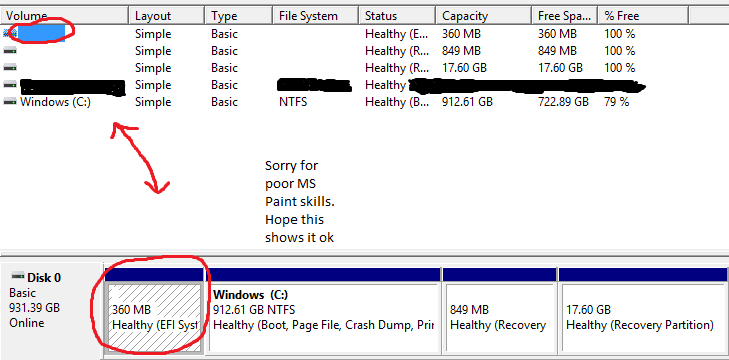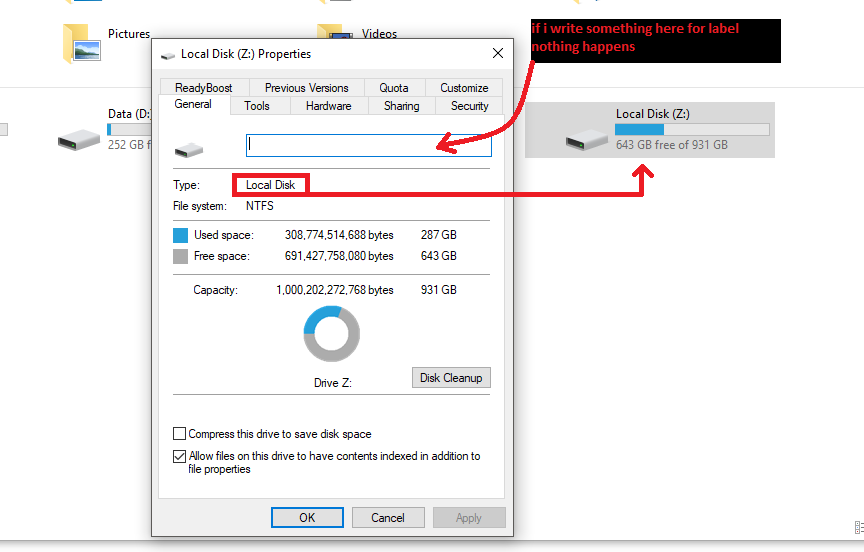Local Disk E Appeared
Recently I have the Local E hard drive entry showing in the My Computer window. Prior to this showing, all that ever showed was Local Disk (C and my A drive and CD rom drive designation. Hello, i can't open my local disk drive E.A message always appears saying select a programe to run with Configuration: Windows XP / Internet Explorer 6.0. Page 1 of 2 - Mysterious Added Drive - posted in Windows 10 Support: Yesterday, I noticed that this mysterious drive appeared on my computer with my other drives. The drive is only about 500.
The Hitachi Filter Driver can make a specific device appear as 'Local Disk' instead of 'Removable Disk' in My Computer. I need to do the reverse: Make a a 'Local Disk' (ATAPI, SCSI, Firewire, USB, SATA/eSATA) appear as a 'Removable Disk' under WinXP. Here an example: How can I make the internal HDD appear as a Removable Disk in My Computer?Could one change some parameters in Cfadisk.inf to make the Hitachi Filter Driver work the other way around?
Under Win98 it is quite easy: Device Manager - Disk drives - right-click on specific drive - Properties - Settings tab - select 'Removable'.Any ideas on how to change the disk type under WinXP? Maybe it would be easier to modify the source of cfadisk.sys to get a 'rcfadisk.sys' Definitely nothing in the.inf will do.Thanks dencorso, thanks jaclaz, it looks quite involved. I was just trying to find a quick way to get some old software to work perhaps.Specifically, I am currently trying to get 2 old programs, FixDVD! And FixUDF!, to diagnose and repair UDF-formatted non-CD/DVD media (floppies, zip disks, jaz disks, LS-120 disks, HDDs, SDHC & CF cards) using various interfaces under Win98SE and WinXP (ATAPI, SCSI, parallel port, PCMCIA, Firewire, USB and eSATA). Are comparable to Chkdsk under FAT.Up to now I have only been able to make FixDVD!

Diagnose and repair UDF-formatted Jaz and zip disks. These are removable media, so I speculated that by making other UDF-formatted media appear removable, FixDVD! Might swallow them.When I attempt to diagnose under Win98 or WinXP UDF-formatted HDDs or UDF-formatted SDHC cards, FixDVD! Terminate with the message 'Unable to lock the disk. Scan aborted'.
BTW, I had gotten the same message when trying to diagnose a DVD-RAM disk in a USB DVD-drive. These 2 old disk utilities require direct disk access, like chkdsk, but running them with parameters in a Win98 DOS window between LOCK. UNLOCK commands didn't help.If you have any ideas about how to chkdsk UDF-formatted HDDs, or about UDF-formatted mass storage devices in general, please post them at I myself will eventually add more articles there.A little OT, it looks like the sluggish-file-delete problem under Win98-cum-IE6 does not occur (or occurs in a much less severe form) when deleting e.g. 6000 files from my UDF-formatted HDD. Edited December 2, 2009 by Multibooter. I would try seeing what happens in XP using a USB adapter and rdummy.sys.Hi jaclaz,1) I am not sure how to install rdummy.sys on an already installed WinXP.- I booted into WinXP with a UDF-formatted USB HDD connected (displayed as 'Local disk'),- copied rdummy.sys to WinXPsystem32drivers,- made a.reg file from the code in posting #418,- ran the.reg file.But upon rebooting into WinXP the USB HDD is still displayed as a 'Local disk'. Any suggestions?2) If I could make the 'Local Disk' appear as type 'CD Drive' in My Computer under WinXP, FixUDF!
Will possibly swallow the USB HDD. Is there any way to make a 'Local Disk' appear as a 'CD Drive' in My Computer? In this way a LOT of other old/abandoned UDF/DVD-RAM software might possibly work with UDF-formatted HDDs (The revision UDF v2.01 was released on 15-Mar-2000, so it's an old standard, the current release is 2.60. 'For next releases of UDF, changes are discussed in relation to using UDF on very large hard disk media, and using UDF on holographic storage media.'
)3) An old product description of FixUDF! Stated that it works with HDDs and removable drives, but this info has been deleted from newer product descriptions of the same product. The modification date of the last version of FixUDF! V2.0.0 I have seen is 12-Dec-2001. Windows XP was first released on 25-Oct-2001. Could it be that FixUDF! Only works on HDDs with the initial release of WinXP, not with later SPs?

I have been using SP2 Pro. Could it be that the msg 'Unable to lock the disk. Scan aborted' is caused by something in the SPs? Edited December 2, 2009 by Multibooter. 3) It is possible, XP has also the VSS services that do strange things on the system, I would try using good ol' 2K, seemingly OT, but maybe not too much:Thanks jaclaz,I installed the initial release of Windows 2000 and then tested FixUDF! Both programs could then check and repair errors on a UDF-formatted ATAPI 120GB HDD in the left bay of my laptop.
This is a break-through, it was the first time that I got this software to check and repair a UDF-formatted HDD.Under the initial release of Win2k these 2 programs, however, cannot check/fix USB mass storage devices (e.g. A USB HDD or a SDHC card-reader), their drive letters are not displayed in the drive letter selector of FixDVD!/FixUDF! Also, under the 1st release of Win2000, the SAI UDF file system driver (read/write) does not work on USB mass storage devices: a UDF-formatted HDD attached via USB is read-only (the read-only MS UDF file system driver is probably active there), while at the same time a UDF-formatted ATAPI HDD in the left bay of my laptop is read AND write, i.e. The SAI UDF file system driver works there.So FixUDF! Do work with UDF-formatted HDDs, if you use a specific version of Windows and a specific interface.
Local Disk E Appeared On Tv
I will eventually check whether these 2 programs work also with Win2K SP1 and SP2 and with the 1st release of WinXP. Under which of these 3 versions of Windows might FixUDF! Work with UDF-formatted USB mass storage devices (USB HDD, SDHC cards, CF cards)?BTW, the file modification date of the files installed by the 1st version of Windows 2000 is 12-7-99 12:00 PM, so WINDOWS 2000 is exactly 10 years old today!
Edited December 8, 2009 by Multibooter.